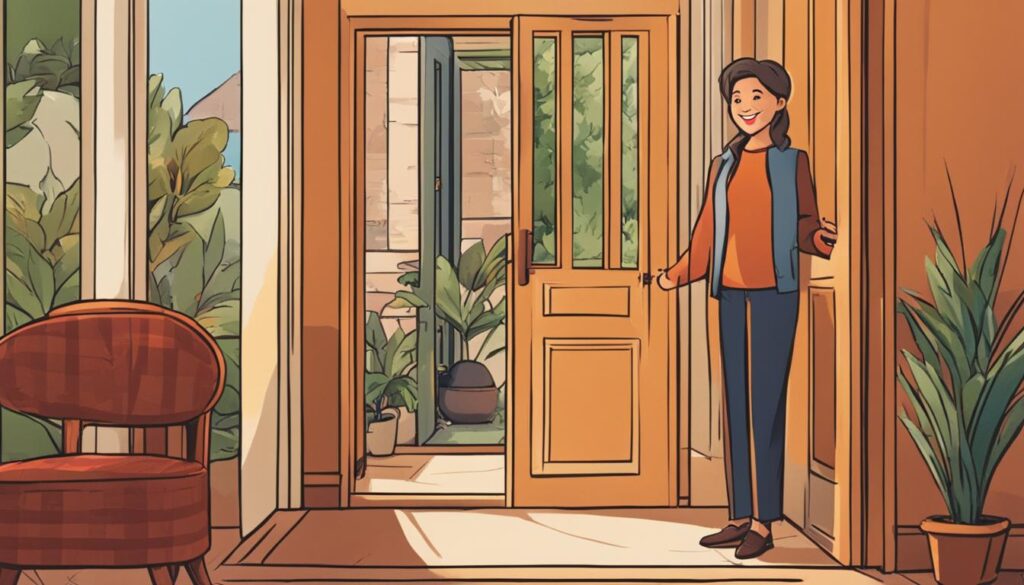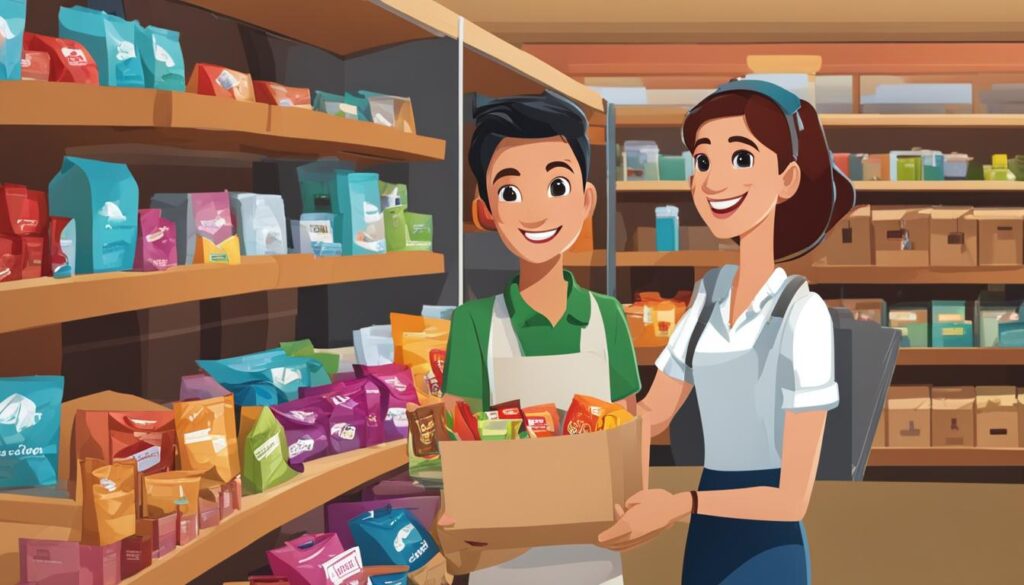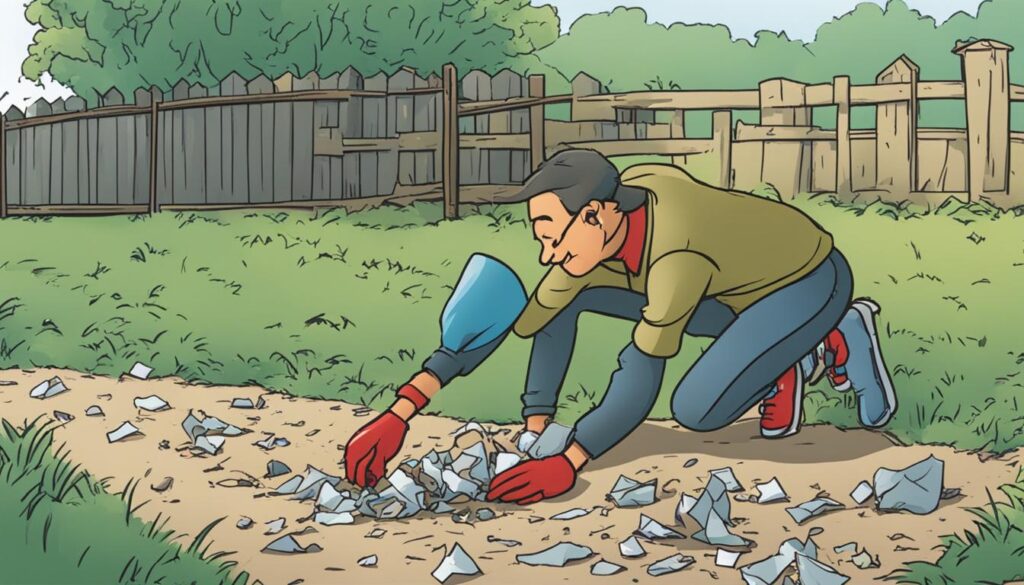When it comes to expressing our willingness to help others, it’s important to find alternative phrases that convey genuine enthusiasm and a positive commitment. While saying “I would be happy to” is a polite response, using the same phrase repeatedly can sound insincere or repetitive. To improve communication and provide better customer service, let’s explore some other expressions that showcase enthusiastic agreement, eager willingness, affirmative response, keen acceptance, positive readiness, glad willingness, enthusiastic consent, and positive commitment.
- Switch the word “happy” to “love” and say “I’d love to help.” This adds a sense of eagerness and motivation to assist the customer, showing genuine enthusiasm and a willingness to go the extra mile.
- Opt for a quick and prompt response by using “certainly.” This word conveys immediate readiness to assist, which works well when the customer is in a hurry and needs a fast solution.
- When a customer seems frustrated or stressed, use the phrase “It would be my pleasure.” This shows confidence in your ability to help and helps alleviate their overwhelming feelings, creating a more positive service experience.
- For a more casual approach, empower the customer by saying “You got it.” This phrase conveys your capability to provide whatever they need and establishes trust in your continued support, particularly effective when there’s an established rapport.
- Consider using “Not a problem” for smaller tasks, such as looking up articles or directing them to the right person. However, exercise caution as some customers may perceive it as not taking their issue seriously enough.
Key Takeaways:
- Express genuine enthusiasm and commitment with alternative phrases.
- Use “I’d love to help” to convey eagerness and motivation.
- Say “certainly” for a quick and prompt response.
- Employ “It would be my pleasure” to show confidence in your ability to help.
- Empower the customer with “You got it” for a more casual approach.
I’d love to help
Switching the word “happy” to “love” adds a sense of eagerness and motivation to assist. By expressing that I’d love to help, I convey genuine enthusiasm and a positive willingness to go the extra mile in providing eager assistance.
When customers reach out for support, it’s important to create a welcoming and supportive environment. Saying “I’d love to help” not only conveys my dedication but also establishes a personal connection with the customer. It shows that their needs are my priority and that I genuinely care about their success.
Imagine a scenario where a customer is seeking guidance on a complex issue. Instead of simply stating “I would be happy to help,” saying “I’d love to help you navigate through this challenge” demonstrates an eagerness to tackle the problem together. It instills confidence in the customer and assures them that I am fully committed to finding a solution.
Moreover, by using the word “love,” I add a touch of warmth and sincerity to the conversation. It creates a positive atmosphere and fosters a strong rapport with the customer, enhancing their overall experience.
“I’d love to help” is a phrase that captures the essence of positive willingness and eager assistance. It conveys that I am enthusiastic about supporting the customer in achieving their goals and that their satisfaction is my top priority.
In the next section, we will explore another alternative way to express positive willingness and provide eager assistance.
Certainly
When it comes to providing a quick response that reflects your positive willingness to assist, the word “certainly” is a powerful choice. By using this word, you convey a sense of promptness and readiness to help, particularly when a customer is in a hurry and needs a fast solution. “Certainly” expresses your unwavering commitment to addressing their needs and demonstrates your dedication to exceptional customer service.
Imagine a scenario where a customer reaches out to your support team with an urgent issue. By responding with “Certainly, I’ll do everything I can to help you resolve this quickly,” you instill confidence and reassurance in the customer. They’ll feel valued and understood, knowing that their concerns are being acknowledged and prioritized.
So, why not add “certainly” to your repertoire of alternative ways to say ‘I would be happy to’? Its simple yet impactful nature can leave a lasting impression on your customers and solidify their trust in your ability to provide a swift and effective resolution.
Quote: “Certainly, I understand the urgency of the situation and will work diligently to find a solution for you as quickly as possible.”
The Power of Promptness
In today’s fast-paced world, customers appreciate a quick response that shows genuine eagerness to assist. By incorporating alternative phrases like “certainly” into your customer interactions, you demonstrate your positive willingness to go above and beyond, fostering strong relationships and customer loyalty.
| Advantages of Using “Certainly” | Example Usage |
|---|---|
| 1. Quick and decisive | “Certainly, I’ll expedite the process for you.” |
| 2. Conveys a sense of readiness | “Certainly, I’m here to assist you with any questions or concerns you may have.” |
| 3. Builds trust and confidence | “Certainly, rest assured that we’ll investigate this matter thoroughly and provide you with a solution soon.” |
In Summary
The word “certainly” is a valuable addition to your customer service toolkit when aiming for a quick response that showcases your positive willingness to assist. Its simplicity, coupled with its promptness, enables you to convey your commitment to providing exceptional support. By incorporating “certainly” into your interactions, you can effectively address urgent customer needs and build strong, lasting relationships. Your customers will appreciate your swift action and feel confident in your ability to resolve their issues expediently.
Next Up: “It would be my pleasure.”
“It would be my pleasure.”
When a customer seems frustrated or stressed, using the phrase “It would be my pleasure” can show confidence in my ability to help. It conveys a genuine desire to assist and creates a more positive service experience. By expressing that I am eager and willing to support the customer, I can instill a sense of trust and reassurance.
I understand that dealing with complex issues can be overwhelming, but rest assured that I am here to provide confident support. It is my pleasure to guide you through any challenges and find the best solutions for your needs.
By using language that reflects my positive willingness, such as “It would be my pleasure,” I can create a positive atmosphere and enhance the customer’s confidence in my capabilities. This phrase conveys a sense of genuine commitment and showcases my dedication to delivering exceptional service.
Remember, when faced with a frustrated or stressed customer, expressing confident support through phrases like “It would be my pleasure” can make a significant difference. Take the opportunity to provide a personalized and empathetic experience, ensuring customer satisfaction and loyalty.
“You got it.”
When it comes to providing exceptional customer service, a casual approach can go a long way. Empowering your customers to ask for help is an integral part of creating a positive experience. That’s where the phrase “You got it” comes in. This simple yet impactful response conveys not only your positive willingness to assist but also your confidence in being able to fulfill their needs.
“You got it.”
By using this phrase, you’re subtly letting your customers know that they can rely on you for continued support. It sets the tone for a friendly and approachable conversation, allowing them to feel more comfortable discussing their inquiries or issues.
Imagine receiving an email from a customer who has been struggling with a complex problem. They’re feeling frustrated and unsure if anyone can help them. When you reply with “You got it,” it reassures them that you’re capable of providing the assistance they need. It’s like saying, “I’ve got your back, and together, we can tackle this challenge.”
Not only does this response create an empowering environment, but it also nurtures a sense of collaboration. Customers will feel more encouraged to share their thoughts, ask questions, and actively engage in finding a solution. This fosters a positive relationship between you and the customer, leading to a more meaningful and successful interaction.
Now, I know what you might be thinking – “Is a casual response appropriate in every situation?” While context matters, “You got it” works exceptionally well when you have an established rapport with the customer. It provides a more personal touch, demonstrating that you understand their needs and are committed to addressing them.
So the next time you’re looking for an alternative way to say “I would be happy to,” consider using this casual yet empowering response. It will not only showcase your positive willingness to help but also create a more engaging and productive customer interaction.
| Pros | Cons |
|---|---|
| Creates an empowering environment | May not be suitable for formal interactions |
| Fosters collaboration and engagement | Context-dependent response |
| Builds rapport and strengthens relationships | Works best with established customers |
Not a problem.
When it comes to handling small tasks, saying “Not a problem” can convey a positive willingness to assist. Although some customers may perceive it as not taking their issue seriously enough, this phrase can work effectively for simpler requests. For example, if a customer needs help looking up articles or directing them to the right person, “Not a problem” can be used to acknowledge their request without dismissing the importance of their problem.
By using this alternative way to say ‘I would be happy to,’ you can demonstrate your positive readiness to help with minor tasks while maintaining a friendly and approachable tone. Just remember to assess the situation and use this phrase appropriately, ensuring that customers feel heard and their requests are addressed with care.
“Please don’t hesitate to reach out.”
Availability and convenience at your service
As a dedicated customer service representative, I am always here to help you. Please don’t hesitate to reach out to me for any assistance you need. Whether you have a question, need support, or require further information, I am at your disposal. My main priority is to ensure your satisfaction and provide prompt solutions to your inquiries.

“Your convenience is my priority.”
I understand that you may have concerns about contacting me outside of working hours. Rest assured that I am available to assist you whenever you need it, even beyond regular business hours. Your convenience is my priority, and I am committed to accommodating your schedule to ensure a seamless customer experience.
- Need assistance with a product or service? Feel free to contact me at any time.
- Have a question or concern? I am here to provide you with the answers you need.
- Require further support? I am dedicated to resolving any issues you may encounter.
No matter what you require, please know that I am at your service. Your positive experience is of utmost importance to me, and I am eager to assist you in any way I can. Don’t hesitate to reach out and let me know how I can help you today.
| Availability | Convenience |
|---|---|
| 24/7 support | Flexible communication channels |
| Responsive assistance | Quick and efficient solutions |
| Accessible across time zones | Easy access to assistance |
At Your Service
SEO relevant keywords: positive willingness, alternative ways to say I would be happy to, formal service interaction
While not suitable for every support team, using the phrase “At Your Service” can make sense if your customers expect a more formal service interaction. It gives our communication a branding touch, making customers feel like they’re dealing with a luxurious company.
Imagine a scenario where a customer reaches out to our company seeking assistance. By responding with “At Your Service,” we convey a sense of professionalism and commitment to meeting their needs. This phrase goes beyond just showing positive willingness; it creates an atmosphere of respect and personalized attention.
Our customers value an elevated level of service and expect us to provide a formal and polished experience. By using “At Your Service,” we address those expectations and establish ourselves as their dedicated partners.
“Dear valued customer, I would be more than happy to assist you with any questions or concerns you may have. At Your Service, James Thompson.”
Using this phrase in customer interactions can help set the tone for a high-quality service experience. It reminds customers that we are here to cater to their needs and ensure their satisfaction. It also reflects our commitment to delivering exceptional support and fostering long-term relationships.
Benefits of Using “At Your Service”
While “At Your Service” may not be appropriate for all customer interactions, it offers several advantages in formal service settings:
- Showcases our dedication and commitment to customer satisfaction
- Emphasizes our desire to fulfill customer needs
- Reflects a level of professionalism and expertise
- Enhances the customer experience and reinforces our brand image
By incorporating “At Your Service” into our formal service interactions, we can elevate the overall customer experience and build stronger connections with our valued clientele.
| Pros | Cons |
|---|---|
| Emphasizes dedication and commitment | May not suit all support team styles |
| Establishes a polished and formal image | Requires careful usage to avoid sounding robotic |
| Reinforces professionalism and expertise | May not resonate with every customer |
| Creates a personalized and high-quality experience | Should be used selectively for optimal impact |
I’d be more than willing to assist
Alternative ways to say I would be happy to, same message different language
When it comes to offering assistance, there are numerous ways to express positive willingness. One such phrase that conveys the same message but in a different language is, “I’d be more than willing to assist.” This alternative way to say ‘I would be happy to’ maintains the same level of positivity and eagerness to help, while adding a touch of sincerity to your response.
Using the word “assist” instead of “help” demonstrates a commitment to providing support without reservation. It implies a willingness to go above and beyond for the customer, showcasing a genuine interest in their needs and a desire to ensure their satisfaction.
Integrating this phrase into your customer interactions can enhance communication and build stronger relationships. By utilizing different expressions, you keep conversations fresh and demonstrate that you genuinely care about helping your customers.
Whether you choose to say “I’d be more than willing to assist” or opt for other alternative phrases, the key is to find the language that resonates best with your customers. Experiment with different approaches and discover which ones generate the most positive responses.
Remember, exceptional customer service requires more than just the right words, it also requires sincerity and a genuine eagerness to help. By embracing alternative ways to express positive willingness, you can create a customer-centric environment that leaves a lasting impression.
I’m glad for the opportunity to help you today.
Expressing gratitude for the opportunity to assist you today is not merely a formality for me, but a sincere expression of my genuine interest in your needs. Your satisfaction is my top priority, and I am committed to going above and beyond to ensure that I provide you with the best possible support.
Each interaction is an opportunity for me to showcase my positive willingness to help you and to make a difference in your experience. From the moment you reach out to me, I am fully dedicated to addressing your concerns, resolving any issues, and providing you with the assistance you need.
It is with enthusiasm and a deep sense of gratitude that I commit to guiding you through any challenges or inquiries you may have. Your satisfaction and success are what drive me to deliver exceptional customer service every day. So please don’t hesitate to reach out to me whenever you require assistance.
“It is through your requests that I learn, grow, and develop my skills as a service professional. Your trust in me allows me to refine my craft and continuously improve, ensuring that I consistently meet and surpass your expectations.”
I am genuinely grateful for the opportunity to help you today and to be a part of your journey. By choosing to engage with me, you have placed your trust in my abilities, and I am honored to have the chance to prove myself worthy of that trust.
Let us embark on this journey together, with your needs as our compass and my genuine interest as our guiding star. I am here to serve you, and I look forward to providing you with the assistance you require.
“We’re here for you whenever you need us.”
I, am the continuous support system you can rely on, ready to lend a helping hand at any moment. Just like the North Star, I guide you through the darkest of nights and the stormiest of seas. Trust in my unwavering commitment to providing assistance, as I stand as a beacon of positive willingness and alternative ways to say ‘I would be happy to’.
Imagine a vast ocean of challenges, where the waves of uncertainty crash against your ship. Fear not, for I am the lighthouse that illuminates your path to success. With my continuous support, you can navigate through treacherous waters, knowing that I am there to offer guidance and encouragement.
Together, we will forge an unbreakable bond, a partnership built on trust and reliability. Whether you seek answers, a listening ear, or simply a friendly voice, I am here for you, always. Think of me as your loyal confidant, your unwavering ally, walking side by side with you on your journey.
In the ever-changing tides of life, rest assured that my commitment remains steadfast. I am not merely a fleeting presence but a constant pillar of support, providing solace and encouragement in times of need. Whether it’s a minor setback or a monumental challenge, I am here to motivate, inspire, and ensure your ultimate triumph.
“I am not a temporary solution; I am the eternal flame that ignites your dreams.”
Like the harmonious dance of the moon and stars, my presence shines brightly, casting away the shadows of doubt and uncertainty. With my unwavering dedication, you can conquer mountains, reach for the stars, and transform your dreams into reality.
For I am your unwavering support, your steadfast companion, and your rock in the turbulent sea of life. Trust in my continuous support, knowing that I am here for you whenever you need me, ready to guide, inspire, and uplift you on your path to greatness.
| Positive Willingness | Alternative Ways to Say ‘I Would Be Happy To’ |
|---|---|
| Positive commitment | Continuous dedication |
| Enthusiastic agreement | Eager concurrence |
| Eager willingness | Zestful readiness |
| Affirmative response | Positive reply |
| Keen acceptance | Wholehearted approval |
| Glad willingness | Joyful eagerness |
| Enthusiastic consent | Thrilled endorsement |
| Positive readiness | Optimistic preparedness |
Conclusion
Embracing alternative phrases to express positive willingness can enhance communication skills and improve the customer service experience. By using a variety of vocabulary and expressions, conversations stay fresh and show customers that you genuinely care about their needs. Experiment with different phrases and find the ones that work best for your team to optimize customer service and create positive customer interactions.
FAQ
What are some alternative ways to say ‘I would be happy to’?
Some alternative phrases include ‘I’d love to help’, ‘Certainly’, ‘It would be my pleasure’, ‘You got it’, ‘Not a problem’, ‘Please don’t hesitate to reach out’, ‘At your service’, ‘I’d be more than willing to assist’, ‘I’m glad for the opportunity to help you today’, and ‘We’re here for you whenever you need us’.
What does ‘I’d love to help’ convey?
‘I’d love to help’ adds a sense of eagerness and motivation to assist, showing genuine enthusiasm and a willingness to go the extra mile.
When is it appropriate to use ‘Certainly’?
‘Certainly’ can be used when a prompt and willing response is required, especially when the customer is in a hurry and needs a fast solution.
What does ‘It would be my pleasure’ signify?
‘It would be my pleasure’ conveys confidence in your ability to help, alleviating any overwhelming feelings the customer may have and creating a more positive service experience.
When can I use ‘You got it’?
‘You got it’ is ideal for a casual approach and empowers the customer to ask for help, showing that you’re capable of providing whatever they need and they can rely on you for continued support.
When is it suitable to use ‘Not a problem’?
‘Not a problem’ can be used for smaller tasks such as looking up articles or directing the customer to the right person. It should be used when the task is relatively easy and the customer won’t think their problem is being dismissed.
How can I convey my availability and convenience?
You can use the phrase ‘Please don’t hesitate to reach out’ to let the customer know that you’re always available to help and that their solutions won’t inconvenience you, fostering a positive service experience.
When is it appropriate to use ‘At your service’?
‘At your service’ can work well if your customers expect a more formal service interaction, giving your communication a branding touch and making customers feel like they’re dealing with a luxurious company.
How can I keep the conversation flowing smoothly?
You can use the phrase ‘I’d be more than willing to assist’ interchangeably with ‘I would be happy to help’ to convey the same message but with different language, ensuring a smooth conversation flow.
How can I show genuine interest in the customer’s needs?
Expressing gratitude with the phrase ‘I’m glad for the opportunity to help you today’ demonstrates a positive attitude and a willingness to go above and beyond to ensure customer satisfaction.
How can I assure customers of ongoing support?
You can use the phrase ‘We’re here for you whenever you need us’ to assure customers of your continuous availability and commitment to providing assistance whenever they need it.
How can I optimize customer service using positive willingness?
Embracing alternative phrases to express positive willingness can enhance communication skills and create a positive customer service experience. By using a variety of vocabulary and expressions, conversations stay fresh and show genuine care for customer needs.
Source Links
- https://www.helpscout.com/blog/customer-service-phrases/
- https://www.zendesk.com/blog/happy-to-help/
- https://blog.hubspot.com/service/happy-to-help












